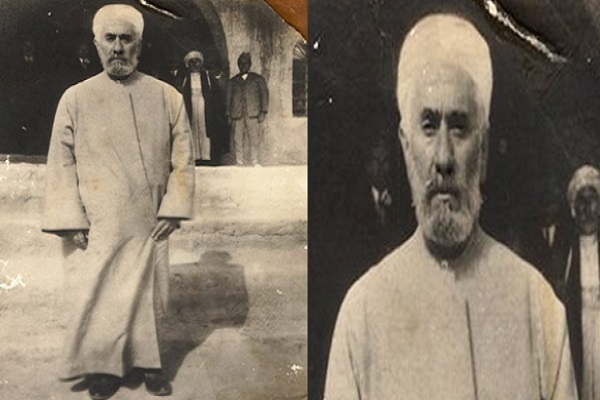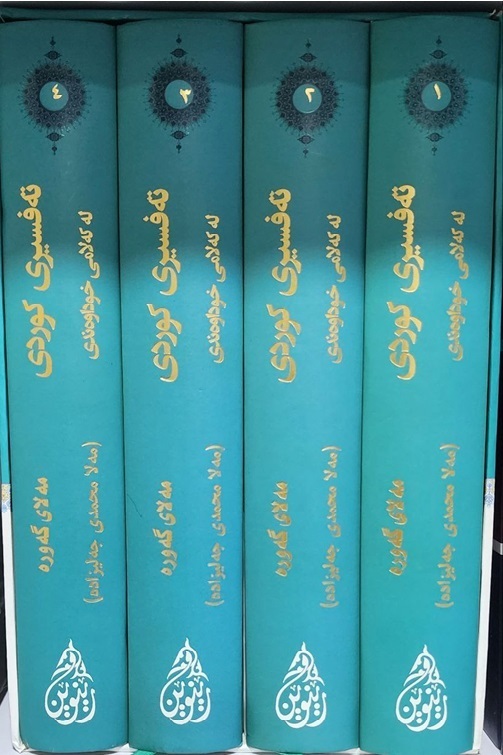Mullah Muhammad Jalizadah’s Interpretation of Quran in Kurdish

In this work, he tried to pay attention to the contemporary social issues and confront some heresies in the society.
Known as Mullah Gewre, ‘Great Mullah’, in Kurdish, he was a renowned Islamic scholar from South Kurdistan in Iraq. He was born and raised in a prominent scholarly family, and his father and grandfather (Mullah Abdullah and Mullah Asa’d Jalizadah) were both also high ranking scholars in the region. Born in the town of Koya (Koy Sanjaq), he began studying the Islamic sciences under his father’s guidance, receiving the traditional Islamic certification for teaching in 1898, at the age of eighteen.
During the course of his life, Mullah Muhamad took up several positions of significance. In 1912 he was appointed as mufti for Koya after the passing of his father, a position which was the origin of his honorific title ‘Great Mullah’. Later, in 1915, he became a member of the Mosul Assembly State Council; and finally, in 1919 he was appointed as a judge, a position he held in Koya for ten years. Later, in 1924, Mullah Muhammad Jalizadah was elected as an Iraqi Constituent Assembly member, representing Koya.
Based on the above, it can be observed that Jalizadah was not merely a traditional scholar, but a unique individual among his contemporaries, possessing extensive knowledge about the most critical issues of his time, and his Tafsīri Kūrdī li-kalāmī Khūdawāndī (‘Kurdish Interpretation of the Word of God’) is considered a distinguished exegesis.
Mullah Muhammad was a prolific scholar, and authored approximately twenty books on various Islamic subjects. However, his most significant contribution is undoubtedly his Tafsir. Composed in the Sorani dialect, which is mainly spoken by Kurds living in eastern Iraq and western Iran, it is considered one of the earliest works written in the Kurdish language. Tafsīri Kūrdī was composed over the course of ten years, from 1933 to 1943. During that time, Mullah Muhammad reached the pinnacle of his intellectual and scholarly career, and his deep understanding of the Quran and its associated disciplines was reflected in his Tafsir.
Mullah Muhammad mentions at the end of Tafsīri Kūrdī that he wrote this work in response to a request from a group of young students in Koya that he help them understand the Quran in their native language. However, the work did not actually appear in print until years after his death. Two editions of Tafsīri Kūrdī have been published, both of which were sponsored by two Kurdish former presidents of Iraq; the first by Jalal Talabani in 2006 (in ten volumes), and the second by Barham Salah in 2020 (in four volumes). This is an indication of the popularity of the book amongst the wider Kurdish community, as well as its importance to Kurdish Islamic scholars.
Read More:
When it comes to the sources Mullah Muhammad used to inform his interpretation, at the end of Tafsīri Kūrdī he mentions a number of Tafsir sources, both classical and modern, including those of al-Ṭabari, al-Zamakhshari, al-Alusi, Tantawi Jawhari, and Rashid Rida. He did not just cite these commentaries, but also gives his opinion on them, saying that he esteems the classical Tafsirs of al-Zamakhshari and al-Alusi above all others, while also showing his admiration for Rida’s al-Manar, saying ‘if it finished, its value doesn’t end’. However, he was less effusive about Tantawi Jawhari’s al-Jawahir fi Tafsir al-Quran al-Karim, merely commenting that it contains ‘some useful thoughts’. Going further, he also accuses some classical works of Taqlid (‘imitation’), saying: ‘Any suggested meaning isn’t true for me; I can’t accept it as an imitation, many times when I read al-Baydawi, I encounter so many interpretations that my mind cannot accept, and say: “Oh my God, your words, to your Messenger! With this strange meaning!”’
Mullah Muhammad explains the purpose of his own commentary in the following terms: ‘I find little value in [the discussion of] complex grammatical constructions and meanings disconnected from the context. Additionally, the derivation of legal rulings and the reasoning of jurists are notably limited in such interpretations, as I consider their arguments quite weak.’ He attempted to achieve thematical unity among Quran chapters, and hence refused those readings of its verses that contradicted this method. This is clear from his commentary on the phrase kitābun uḥkimat ayātuhu (‘A Book whose verses are perfected’) in Q 11:1, in which he says that: ‘The verses of the Holy Quran are completely interconnected; the beginnings of the chapters are like their endings, and their endings are like their beginnings. It is highly organized’.
This understanding of the Quran is also reflected in his discussion of his Tafsir methodology, for example in his comment that: ‘The value of this Kurdish Tafsir is in my opinions and my finding connections between Surahs and verses, for that, I separate many verses from their circumstances of revelation (asbāb al-nuzūl). Many of these asbāb prevent one from understanding the verses, because they do not look to the context of the verses, just to the sabab narratives.

Methodologically speaking, Mullah Muhammad may have been influenced by the rationalist school associated with Muhammad ‘Abduh and Muhammad Rashid Rida in Egypt, mainly via al-Manar.
Mullah Muhammad Jalizadah combats innovation and distortion or corruption of the Text, as well as opposing the interpretations of some Sufi groups that, in his opinion, distort the essence of Islam. He strove to show Islam according to his perception of its real image.
Read More:
In conclusion, it is clear that Jalizadah did not write his Tafsir merely ‘to translate the Quran’, rather he tried to address the problems of his community and solve them in the light of Quranic guidance. For this reason alone, his Tafsīri Kūrdī can be considered unique, and his approach is one that has resulted in a work that still has great and lasting value and popularity among Kurdish Muslims today.
By Farooq Omar Ahmed, University of Halabja, Iraq
Source: gloqur.de



